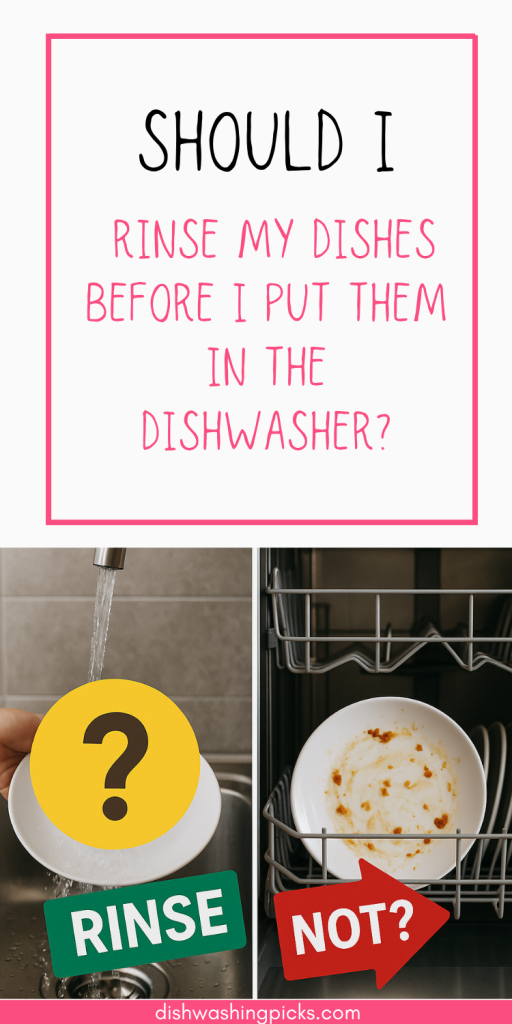
Let’s be real for a sec…
You’re standing at the sink, dinner’s done, stomach’s full, and the only thing between you and the couch is… yep, the dishes. So you pause, look at that stack of dirty plates and think:
“Do I really have to rinse these before putting them in the dishwasher… or is that just something my mom made me do?”
Great question — and you’re definitely not alone. The “to rinse or not to rinse” debate has been dividing households for years. So, let’s cut through the drama and talk about what really matters — your time, your dishwasher, and your dishes.
So… do you actually need to rinse?
Short answer?
💥 Nope. Not really. (Cue dramatic gasp.)
Dishwashers these days are way smarter than they used to be. We’re not talking about your grandma’s 1995 dishwasher that sounded like a rocket launch. Modern dishwashers are basically little cleaning robots with sensors and special detergent that actually work better when there’s a bit of food left on the plate.
Wait, what?! Food makes it clean better?
Weird, right? But yep — many detergents need a little grime to cling to. Some enzymes in those pods you’re using? They’re literally designed to break down food particles. If your dishes are spotless before they go in… there’s nothing for them to do.
Wild.
But… there’s a catch.
Okay, don’t go tossing in plates with half a lasagna still on them. There’s a difference between not rinsing and not scraping.
Here’s what you should do:
- Scrape off big chunks of food. Think bones, peels, clumps of rice — anything that would clog up the filter.
- Give the dish a quick flick into the trash or disposal if there’s gunk on it.
- Then? Load it up. That’s it.
No need to run it under the tap like you’re giving it a pre-shower.
Why rinsing might actually make things worse 😬
Not only is rinsing unnecessary — it can actually mess things up in a couple of ways:
- Wastes water: Rinsing uses way more water than just loading the dishwasher. Like, gallons more. So if you care about saving on your water bill or the planet (or both), that’s a win.
- Confuses your dishwasher: Some machines have soil sensors. If everything’s too clean, it might think the load is light and use a shorter cycle. Translation? Not clean-clean.
- Kills detergent performance: Like we said earlier, enzymes in modern detergent pods need food bits to do their job. If there’s nothing there? They kinda just hang out awkwardly.
But what if your dishwasher is… older?
Great point.
If your dishwasher sounds like a blender full of gravel when it runs, it may not be equipped with all those fancy features. In that case, a light rinse might be okay — just to help it out a bit. Or, try running it on a more powerful setting.
Also? Maybe it’s time to give the ol’ filter a clean. Sometimes, poor cleaning isn’t about the dishes — it’s about what’s trapped down below. (Yes, that gunk-catcher at the bottom? That thing needs love too.)
Let’s settle this once and for all:
🟩 Do:
- Scrape food scraps into the trash or disposal.
- Load dishes without pre-rinsing.
- Trust your dishwasher (especially if it’s newer).
- Use a good detergent pod or gel.
🟥 Don’t:
- Rinse every dish like you’re prepping it for surgery.
- Load huge food chunks into the machine.
- Stack plates so tightly that water can’t reach in between.
Final thoughts: save time, save water, save effort
Imagine this: You just drop your dirty dishes in the machine, hit the button, and walk away — without that whole rinse-and-stack routine.
Feels good, doesn’t it?
So next time someone side-eyes you for not pre-rinsing your plate, you can just smile and say:
“Actually, I’m helping my detergent work better. And saving the planet.” 😌✨
Now go ahead and live your best low-effort dishwashing life. You’ve earned it. 🧽💦🍽️
Want more quick, no-nonsense tips like this? Let me know, and I’ll whip up more for your kitchen sanity.
